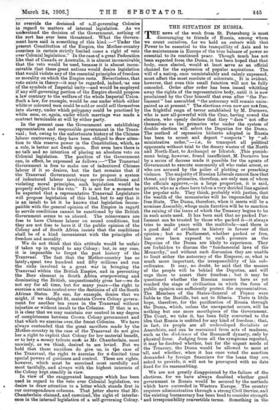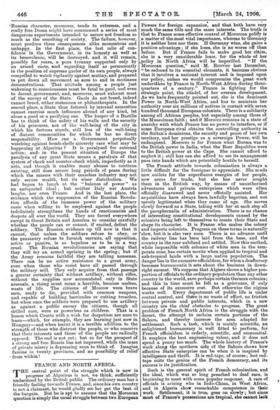THE SITUATION IN RUSSIA. T HE news of the week from
St. Petersburg is 'most discouraging to friends of Russia, among whom we count ourselves, for we hold an entente with that Power to be essential to the tranquillity, of Asia and to themiaintenance in Europe of the true balance of power so essential to its continued peace. Though much has not been expected from the Duma, it has been hoped that that body, once elected, would at least serve as an official channel for the expression of popular aspirations. The will of a natiop, once unmistakably and calmly expressed, must affect the most resolute of autocrats., It is evident, however, that even this small function will not be fully conceded. Order after order has been issued whittling away the rights of the representative body, until it is now proclaimed by the Czar himself that even after " the Par- liament" has assembled " the autocracy will remain unim paired as at present." The elections even now are not free, the frightful reign of terror established by. M. Durnovo, who is now all-powerful with the Czar, having cowed the electors, who openly declare that they " dare " not offer themselves as the primaries who under the system of double election will, select the Deputies for the Duma. The method of repression hitherto adopted in Russia has been to arrest and deport " suspects " by " ad- ministrative order," to transport all political opponents without trial to the dreary wastes of the North and North-East, to Archangel or Irkutsk. This punish- ment being, however, found insufficient, M. Durnovo has by a series of decrees made it possible for the agents of Government to execute summarily all who resist arrest, or who are accused by the police of plotting or preaching violence. The majority of Russian Liberals cannot face that threat, and the primaries, therefow, are only men of whom the officials approve,—in a. large proportion, it is said,, priests, who as a class have taken a very decided line against the popular side. They think, probably with justice, that the wealth of the monasteries will be impounded by the free State. The Duma, therefore, when it meets will be a nominee Assembly, whop main function will be to sanction the raising of the loans of which the Treasury begins to be in such acute need. It has been said that no packed Par- liament can be trusted. by those who packed it—it always tries to make peace with the multitude—and there is a good deal of evidence in history in favour of that opinion ; but no Parliament, whether packed or free, has ever, been exposed to such, pressure as the Deputies of the Duma are likely to experience. They are forbidden to discuss the " fundamental laws of the Monarchy," and without such discussion they are unable to limit either the autocracy of the Emperor, or, what is much more important, the irresponsibility of his sub- ordinates. It may, no doubt, be said that the masses of the people will be behind the .Deputies, and will urge them to assert their freedom ; but it may be questioned whether the Russian masses have as yet reached the stage of civilisation in which the force of public opinion can sufficiently protect the representatives. The Members of the States-General of France were liable to the Bastille, but not to Siberia. Theie is little hope, therefore, for the pacification of Russia through the Duma, which, unless the unexpected occurs, will be nothing but one more mouthpiece of the Government. The Court, we take it, has been fully converted to the idea that Russia is unfitted for any kind of freedom ; that, in fact, its people are all undeveloped • Socialists or Anarchists, and can be restrained from acts of madness, such as the decMance of the Romanoff dynasty, only by physical force. Judging from all the symptoms reported, it may be doubted whether, but for the urgent needs of the Treasury, the Duma would be allowed to meet at • all, and whether, when it has once voted the sanction demanded . by foreign financiers for 'the loans they are, asked to provide, it will not be prorogued with no date fixed for its reassembling.
We are not greatly disappointed by the failure of the elections, for we have always doubted whether good government in Russia would be secured by the methods which have succeeded in Western Europe. The country requires administration through a strong Civil Service, and the existing bureaucracy has been bred to consider strength and irresponsibility convertible terms. Something in the 'Russian character, moreover, tends to extremes, and a really free Duma might have commenced a series of most dangerous experiments intended to secure not freedom so much as the remelting of society.. The failure, however, must produce three consequences alike momentous and unhappy. In the first place, the last relic of con- fidence in the Government, in its honesty as welt as its benevolence, will be destroyed, and it will remain, possibly for years, a pure tyranny supported only by an armed caste, end regarding itself as permanently in the position of supreme gaoler of its own people, always compelled to watch vigilantly against mutiny, and prepared to put down all movement as surd to end in mutinous demonstrations. That attitude among a people just wakening to consciousness must be fatal to good, and even to decent, government, and, moreover, must exhaust most of the energy of the State. Gaols do not breed, indeed ' cannot breed, either statesmen or philanthropists. In the second place, a State thus fettered by internal necessities cannot exercise much influence abroad of any kind, let alone a good or a pacifying one. The keeper of a Bastille has to think of the safety of his walls and the security of his prisoners, not of the well-being of the city in which his fortress stands, still less of the well-being of distant communities for which he has no direct responsibility. How can a Government perpetually watching against bomb-shells sincerely care what may be happening at Algeciras ? It is paralysed for external action; and• in the present situation of Europe the paralysis of any great State means a paralysis of that system of check and counter-check which, imperfectly as it acts, and though it enables many abuses to continue existing, still does secure long periods of peace during which the masses with their ceaseless industry may not only secure wealth, but its wiser distribution. We had begun to laugh at the " balance' of power " as an antiquated ideal ; but neither Italy nor Austria laughs, nor even France. And in the last place, the evidence which the suppression of the Russian Revolu- tion affords of the immense power of the military caste when willing to be employed against the people indefinitely, strengthens the hands of reactionaries and despots all over the world. They are forced everywhere except in Great Britain and America to consider carefully whether the people can or cannot, if excited, defeat the soldiery. The Russian -evidence up till now is that it cannot, ' that unless the soldiers refuse to obey, or the peasantry refuse to furnish recruits, all opposition, active or passive, is so hopeless as to be in a way cruel. The Russian revolutionaries are saying that they will try an armed uprising in the spring ; but if the Army remains faithful they are talking nonsense. There can be no active resistance to a great army, even when those who resist have all passed through the military mill. They only acquire from that passage a greater certainty that without artillery, without rifles, without the supplies now accumulated only in State arsenals, a rising must mean a horrible, because useless, waste of life. The citizens of Moscow were brave men, ready to die, provided with common weapons, and capable of building barricades or cutting trenches, but when once the soldiers were prepared to use artillery as against a public enemy the citizens, though all drilled men, were as powerless as children. That is a lesson which Courts with a wish for despotism are sure to learn—which, for example, they are learning just now in Hungary—and when learnt it is a terrible addition to the strength of those who distrust the people, or who conceive that their interests and those of the people are radically opposed. The end is not yet; but so far the prospect of a strong and free Russia has not improved, while the mass of private misery is depressing even to think of. Imagine, famine in twenty provinces, and no possibility of relief • from within!











































 Previous page
Previous page